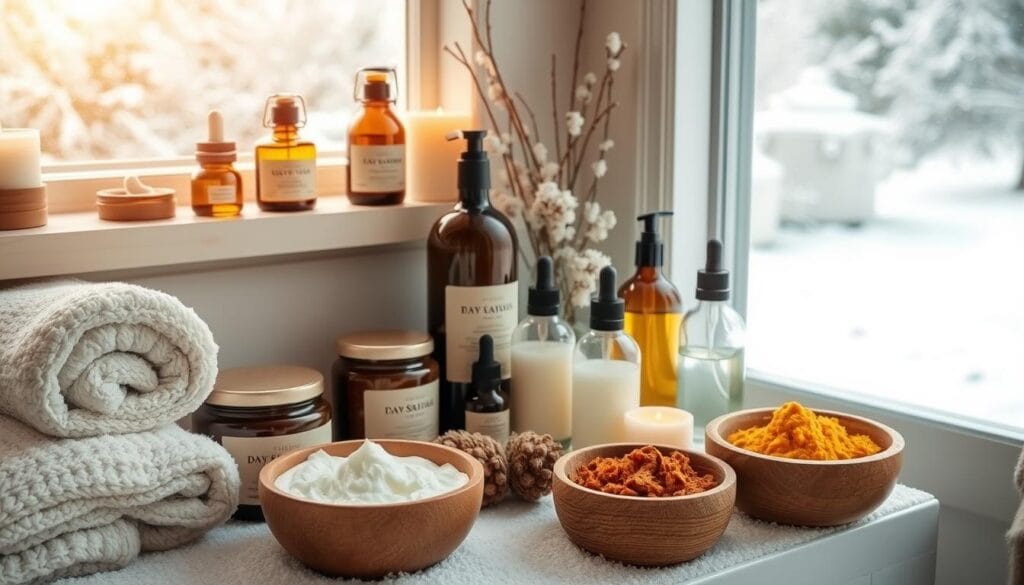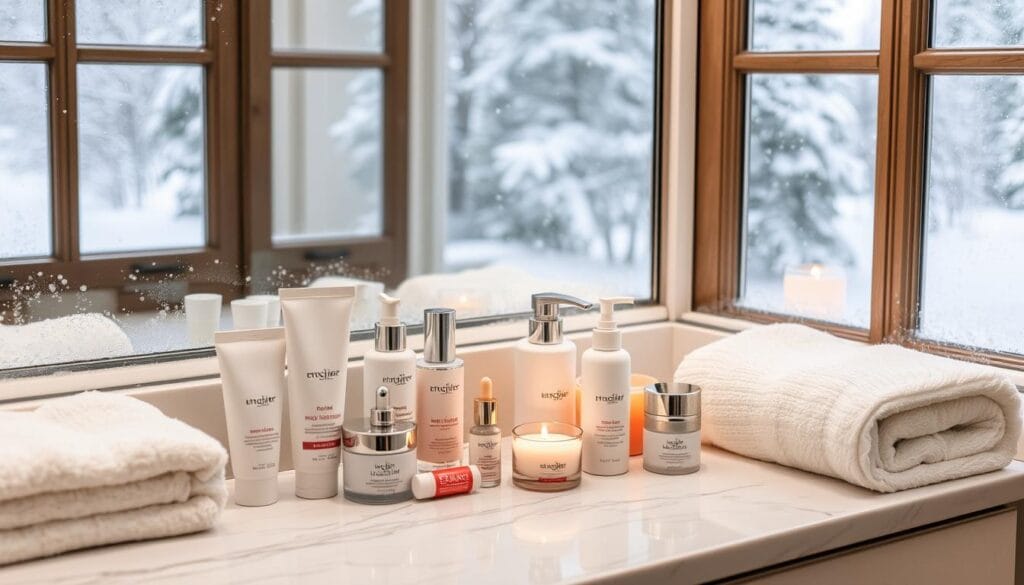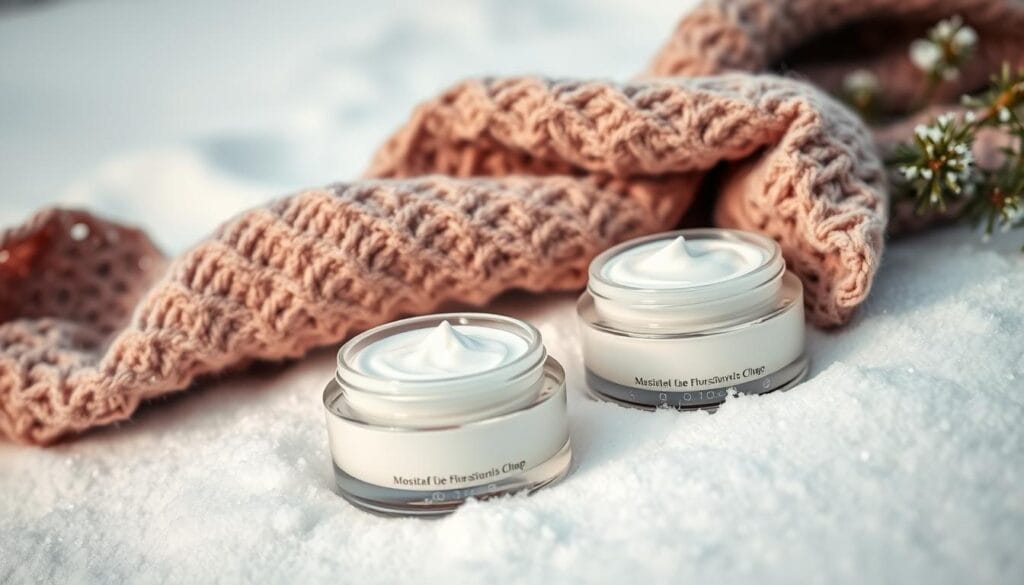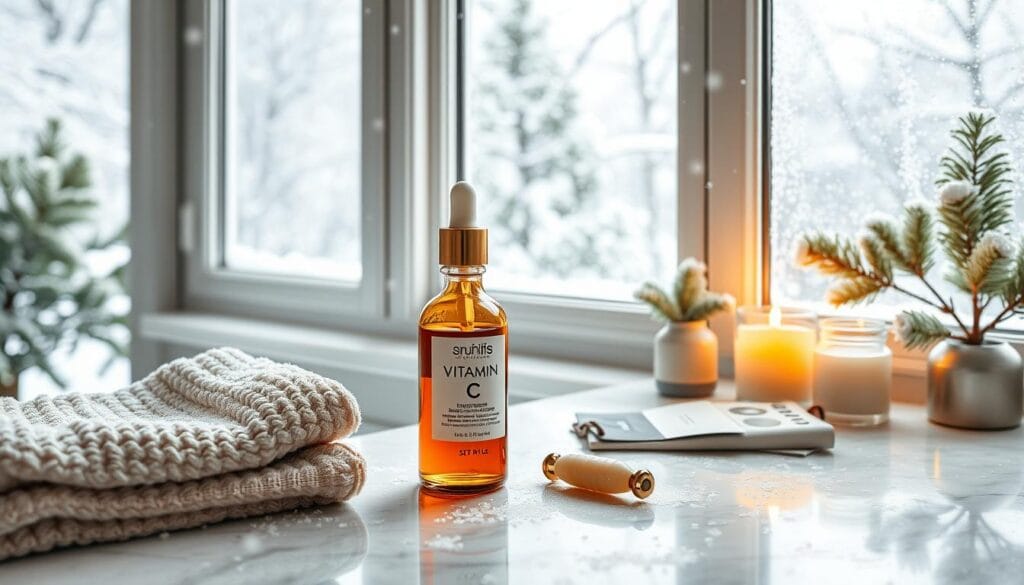As winter comes, women need to focus on their skincare. Cold weather and dry air can harm our skin. Protecting our skin is key to keeping it healthy and glowing, even in tough seasons.
Good winter skincare is more than just using a lot of moisturizer. It’s about finding the right products for your skin type. This helps avoid dryness, flaking, and irritation. By following moisturizing tips, your skin will stay healthy all winter.
Choosing the right products and habits is vital for protecting your skin. This keeps your skin looking young and vibrant all year. In this article, we’ll talk about why cold weather skincare matters. We’ll also share tips to keep your skin nourished and protected all winter.
The Harsh Effects of Winter on Your Skin
When it gets colder, our skin faces many challenges. It can feel dry, irritated, and damaged. To keep your skin safe in winter, knowing how cold weather affects it is key.

Low humidity and dry air are big problems in winter. They take moisture from your skin, causing dehydration and flakiness. That’s why using dry skin remedies and a good winter skincare routine is essential.
Low Humidity and Dry Air
Indoor heaters make the air even drier. They take moisture from the air and your skin. Using a humidifier at home or work can help add moisture back.
Cold Temperatures and Chilly Winds
Cold air and winds can also harm your skin. They can cause redness, chapping, and windburn. Your skin might feel raw and sensitive. To protect it, wear warm clothes, like gloves and a scarf, outside.
Knowing how winter weather affects your skin helps you prepare. Use dry skin remedies and a good winter skincare routine. This way, you can keep your skin healthy and glowing all season.
Common Winter Skin Problems
When it gets cold, many women face skin issues like dryness and tightness. Knowing these problems helps you create a good winter skincare plan. This keeps your skin healthy and glowing all season.

Dry, Flaky Skin
Dry, flaky skin is common in winter. Low humidity, cold, and wind take away your skin’s moisture. This makes your skin dull and rough. Use gentle exfoliation and rich moisturizers to fight dryness.
Chapped Lips and Hands
Lips and hands get dry fast in winter. Chapped lips and hands are not only ugly but also hurt. Use moisturizing lip balm and hand cream often to protect them.
| Problem | Solution |
|---|---|
| Chapped Lips | Use a nourishing lip balm with SPF |
| Dry Hands | Apply a rich hand cream after washing |
Windburn and Redness
Wind can make your skin red and sore. Always wear a scarf or hood outside. Aloe vera and chamomile can help soothe redness and discomfort.
Remember, a proactive approach to winter skincare is key to maintaining a healthy, glowing complexion all season long.
By tackling winter skin problems, you can adjust your skincare for the cold months. Use gentle cleansers, rich moisturizers, and protective lip and hand treatments. This will help your skin stay healthy, even in harsh weather.
The Importance of Moisturizing in Winter
As winter gets closer, it’s key to change your skincare routine. Low humidity and cold winds can harm your skin. Using a good moisturizing cream daily is vital to keep your skin hydrated and protected.
When it’s cold and dry, your skin loses moisture fast. This can cause dryness, flakiness, and irritation. A moisturizer acts as a shield, keeping moisture in and preventing loss. Regular use helps keep your skin balanced and healthy.

Moisturizers also nourish and protect your skin. Look for ones with hyaluronic acid, glycerin, and ceramides. These ingredients help keep moisture in. Some also have antioxidants like vitamin E or green tea extract to fight off damage.
For the best moisturizing tips, apply your cream right after washing and while your skin is damp. This helps it absorb better. Remember to moisturize all over, not just your face. Hands, feet, and other areas can get dry, too.
“Moisturizing is the foundation of any good skincare routine, but it becomes even more important during the winter when the air is dry and harsh on the skin.” – Dr. Shari Marchbein, Board-Certified Dermatologist
Adding a moisturizing cream to your winter skincare is easy and effective. It keeps your skin healthy, hydrated, and glowing. By caring for your skin, you can avoid winter problems and keep your complexion looking young and radiant.
Choosing the Right Moisturizer for Your Skin Type
Finding the perfect moisturizer for winter is key. It depends on your skin type. The right moisturizer keeps your skin healthy and hydrated.

Cream-based Moisturizers for Dry Skin
For dry skin, choose a rich, cream-based moisturizer. It should provide long-lasting hydration. Look for ingredients like hyaluronic acid, glycerin, and shea butter.
Apply it twice a day, morning and night. This will give you the best results.
Lightweight, Oil-free Moisturizers for Oily Skin
Oily skin needs a lightweight, oil-free moisturizer. It should not clog pores or increase shine. Ingredients like aloe vera, green tea, and niacinamide are good choices.
Even oily skin needs moisture, more so in winter.
Balancing Moisturizers for Combination Skin
Combination skin is challenging. You need a moisturizer that hydrates dry areas and controls oil in the T-zone. Look for products with salicylic acid and tea tree oil.
Apply it evenly, focusing on dry or flaky patches.
“Choosing the right moisturizer for your skin type is key to maintaining healthy, glowing skin all winter long.”
Every skin type needs a good moisturizer in winter. The right one protects and nourishes your skin. By choosing the right moisturizer, your skin stays healthy and radiant all season.
Winter Skin Protection: Tips and Tricks
Keeping your skin healthy during winter is key. Follow these simple tips to keep your skin looking and feeling great all season. Even when it’s cold, you can stay beautiful.

Protect Your Skin from Cold and Wind
Shielding your skin from cold and wind is vital. Before going outside, wear a scarf, hat, and gloves. Use a moisturizing cream or balm on your face to protect against windburn and chapping.
Use a Humidifier to Combat Dry Air
Indoor heating makes the air dry, which can irritate your skin. Use a humidifier to add moisture. Keep the humidity level between 40-60% for best skin hydration.
Avoid Hot Showers and Baths
Hot showers or baths may feel nice but can dry out your skin. Use lukewarm water and keep showers or baths short. Pat your skin dry gently and moisturize right after to keep it hydrated.
Drink Plenty of Water to Stay Hydrated
Drinking enough water is vital for healthy skin, even more so in winter. Drink at least 8 glasses a day. If plain water is hard to drink, try adding lemon, cucumber, or mint for flavor.
| Tip | Benefit |
|---|---|
| Protect skin from cold and wind | Minimizes exposure to harsh elements |
| Use a humidifier | Combats dry air and keeps skin hydrated |
| Avoid hot showers and baths | Prevents stripping the skin of natural oils |
| Drink plenty of water | Maintains skin hydration from the inside out |
“Winter skincare is all about layering – layering your clothing to protect from the elements and layering your skincare products to keep your skin hydrated and healthy.”
By following these tips, you’ll have healthy, glowing skin all winter. Cold weather skincare is more than just moisturizing. It’s about protecting your skin and nourishing it from the inside out.
The Benefits of Using a Hydrating Face Mask
Winter weather can dry out our skin. Using a hydrating face mask can help. It adds much-needed moisture and nourishment.

Hydrating face masks deeply moisturize the skin. They contain ingredients like hyaluronic acid and glycerin. These help keep the skin moist and healthy.
“Hydrating face masks are a great way to give your skin an extra dose of moisture during the winter months. They can help soothe and nourish dry, irritated skin, leaving it feeling soft and hydrated.”
These masks also have antioxidants and vitamins. They protect the skin and make it brighter. Adding a hydrating face mask to your routine is a simple way to care for your skin in winter.
Choose a face mask that fits your skin type. If your skin is sensitive, look for aloe vera or chamomile. For oily or acne-prone skin, choose non-comedogenic formulas. The right mask can make your skin healthier and more radiant all winter.
Incorporating Vitamin C into Your Winter Skincare Routine
As winter arrives, it’s key to adjust your skincare to fight off cold weather’s dryness. Vitamin C is a powerful ally for your skin in these months. It’s packed with antioxidants and boosts your skin’s health.

Vitamin C brightens and evens out your skin tone. It’s also vital for keeping your skin healthy in winter. Adding vitamin C to your skincare helps protect your skin from the environment and keeps it looking young and bright.
Boosting Collagen Production
Vitamin C is great for making collagen. Collagen keeps your skin elastic and firm. As we age, our collagen levels drop, causing wrinkles and sagging. Vitamin C in your skincare helps keep your skin firm and youthful.
Protecting Against Free Radicals
Vitamin C also fights off free radicals. These unstable molecules can damage your skin cells, causing early aging. Vitamin C neutralizes these molecules, keeping your skin healthy and glowing in winter.
When picking vitamin C products, look for serums, moisturizers, and masks with ascorbic acid or sodium ascorbyl phosphate. These forms of vitamin C work well to nourish your skin.
| Vitamin C Product | Benefits |
|---|---|
| Serum | Highly concentrated, quickly absorbed |
| Moisturizer | Hydrates and nourishes skin |
| Face Mask | Intensive treatment brightens skin |
Adding vitamin C to your winter skincare routine helps your skin fight cold weather’s dryness. It keeps your skin healthy and glowing all season.
Nourishing Your Skin from the Inside Out
While winter skin protection often focuses on external measures like moisturizing, it’s also key to nourish your skin from within. A balanced diet and supplements can greatly improve your cold weather skincare routine. This helps keep your skin healthy and glowing all season.
Eating a Balanced, Nutrient-rich Diet
To keep your skin looking its best in winter, eat a variety of nutrient-dense foods. Include lots of fruits and vegetables in your diet. They are full of vitamins, minerals, and antioxidants that are good for your skin. Some foods that are good for your skin include:
- Berries, citrus fruits, and leafy greens for vitamin C
- Nuts, seeds, and fatty fish for omega-3 fatty acids
- Sweet potatoes, carrots, and spinach for beta-carotene
- Tomatoes and watermelon for lycopene
Drinking plenty of water is also important for your skin. It helps your skin stay hydrated and maintain its natural barrier.

Taking Supplements for Healthy Skin
Along with a balanced diet, some supplements can give your winter skin protection a boost. Key supplements for healthy skin include:
| Supplement | Benefits |
|---|---|
| Vitamin C | Supports collagen production and antioxidant protection |
| Vitamin D | Helps regulate skin cell growth and repair |
| Omega-3 Fatty Acids | Reduces inflammation and maintains skin moisture |
| Collagen Peptides | It improves skin elasticity and reduces fine lines |
“Beautiful skin starts from within. Nourish your body with the right foods and supplements, and your skin will thank you.”
By focusing on nourishing your skin from the inside, you can enhance your external moisturizing tips and cold-weather skincare routine. A holistic approach to winter skin protection will help you keep your skin healthy and radiant all season.
Protecting Your Lips from Chapping and Dryness
In winter, our lips face harsh cold weather. Chapped, dry lips can be uncomfortable and look bad. But, with the right winter skin protection tips, you can keep your lips soft and moist all season.
Using a good lip balm or chapstick is key. Look for ones with shea butter, beeswax, and vitamin E. These moisturizing products help keep moisture in and protect against cold air and wind.
There are more ways to care for your lips in cold weather skincare:
- Drink lots of water to stay hydrated
- Don’t lick your lips to avoid drying them out
- Use a humidifier to add moisture to your home
- Apply lip balm with SPF to protect from the sun
“Lips don’t have oil glands, so they’re almost always exposed to the elements. They’re very vulnerable to dryness, particular in the winter.” – Dr. Debra Jaliman, Board-Certified Dermatologist
By adding these tips to your daily routine, your lips will stay healthy and moist all winter. Remember, caring for your lips is a big part of your winter skin protection plan.
The Role of Sunscreen in Winter Skin Protection
Many people think sunscreen is only for summer. But it’s also key in winter to protect your skin from the sun. Even on cold, cloudy days, UV rays can harm your skin. This can lead to early aging, dark spots, and even skin cancer. So, sunscreen is a must in your winter skincare routine.
For winter, choose a sunscreen with at least SPF 30. It should protect against UVA and UVB rays. If your skin is dry or sensitive, pick a moisturizing sunscreen. Look for ingredients like hyaluronic acid or ceramides to keep your skin moist and soft.
Apply sunscreen to all skin that’s not covered, like your face, neck, and hands. Reapply every two hours if you’re outside a lot, like skiing. By making sunscreen a part of your winter skincare, you keep your skin healthy and glowing all season.
“Sun protection is a year-round commitment. Just because it’s cold outside doesn’t mean you can skip the sunscreen.”
To boost your winter skin care, try these tips:
- Wear protective clothing, like hats and gloves, to shield your skin from cold and wind.
- Use a humidifier to fight dry indoor air and keep your skin moist.
- Drink lots of water to keep your skin hydrated from the inside.
| SPF Level | UVB Protection |
|---|---|
| SPF 15 | 93% |
| SPF 30 | 97% |
| SPF 50 | 98% |
Caring for Your Hands and Feet in Cold Weather
In winter, our hands and feet face harsh cold. A good cold-weather skincare routine is key. It should focus on winter skin protection and use moisturizing products. This keeps your hands and feet soft and healthy all season.
Wearing Gloves to Protect Your Hands
Wearing gloves is a great way to shield your hands from cold and dry air. Choose gloves that are warm and keep moisture in. Look for:
- Wool
- Cashmere
- Leather with a soft lining
Using a Rich Hand Cream Regularly
Apply a rich hand cream often to keep hands moisturized and prevent chapping. Use it after washing your hands. Pick a cream with hydrating ingredients like:
| Ingredient | Benefits |
|---|---|
| Shea Butter | Deeply moisturizing and nourishing |
| Glycerin | Attracts and retains moisture |
| Vitamin E | Antioxidant that protects and heals skin |
Exfoliating and Moisturizing Your Feet
Don’t forget about your feet in your winter skin protection routine. To avoid dry, cracked heels and calluses:
- Exfoliate your feet once a week with a pumice stone or foot scrub
- Apply a thick, moisturizing foot cream or balm every night before bed
- Wear breathable cotton socks to keep moisture in overnight
“Regular exfoliation and moisturizing are key to maintaining soft, smooth feet during the winter months. Don’t forget to pamper your feet as part of your cold weather skincare regimen.”
– Dr. Emily Smith, Dermatologist
By following these simple steps, you can keep your hands and feet healthy and looking great all winter. Even in harsh weather, they will stay in top condition.
Common Mistakes to Avoid in Your Winter Skincare Routine
When you switch to a winter skincare routine, watch out for common mistakes. These can harm your skin’s health and glow. By steering clear of these errors, you can make sure your routine works well for your skin.
One big mistake is over-exfoliating. Exfoliation is good for removing dead skin cells. But doing it too much can take away your skin’s natural oils. This leaves your skin dry and sore. Stick to exfoliating once or twice a week. Choose gentle, non-abrasive scrubs or chemical exfoliants.
Using harsh, drying products is another mistake. In winter, it’s key to pick moisturizing cleansers, toners, and treatments. Look for hyaluronic acid, ceramides, and natural oils. These help keep your skin moist and shield it from the cold.
Not moisturizing enough is a common error. The dry, cold air and indoor heat make your skin need more moisture. Use a rich, nourishing moisturizer at least twice a day. Pay extra attention to dry spots like elbows, knees, and hands.
“The key to a successful winter skincare routine is finding the right balance of gentle yet effective products that keep your skin hydrated and protected.” – Dr. Sarah Thompson, Dermatologist
Many people forget to protect their skin from the sun in winter. Harmful UV rays can damage your skin, even on cloudy days. Always use a broad-spectrum sunscreen with at least SPF 30. Reapply every two hours if you’re outside for a long time.
By avoiding these common mistakes and adding moisturizing tips to your routine, you can keep your skin healthy and glowing all winter.
When to Seek Professional Help for Winter Skin Issues
While winter skin protection and dry skin remedies work for many, sometimes you need a dermatologist. If your skin stays dry, gets irritated, or has other problems, even with cold weather skincare, it’s time to see a pro.
Severe skin issues like eczema or psoriasis can be tough in winter. They might need strong treatments or special care to control symptoms and avoid skin damage.
Persistent Dryness and Irritation
Trying many moisturizers and dry skin remedies but your skin is dry and irritated? It’s time to talk to a dermatologist. They can find the cause and suggest treatments to fix your skin’s health.
Eczema and Psoriasis Flare-ups
Winter weather can make eczema or psoriasis worse. If your condition gets harder to handle with your usual cold weather skincare, see a dermatologist. They can offer specific advice and treatments to ease your symptoms.
“Seeking professional help for winter skin issues is a key step to keep your skin healthy and comfortable in the cold months.”
Your skin is your biggest organ and needs care. If you’re not sure if you need a dermatologist, it’s safer to get their advice. This way, you can take care of your skin and feel better.
| Winter Skin Issue | When to Seek Professional Help |
|---|---|
| Persistent dryness and irritation | If at-home remedies and moisturizers are ineffective |
| Eczema flare-ups | When symptoms worsen or become difficult to manage |
| Psoriasis flare-ups | If the usual skincare routine fails to control symptoms |
The Long-term Benefits of Winter Skin Protection
Protecting your skin in winter might seem hard, but it’s worth it. A good winter skin care routine can prevent early aging. It keeps your skin healthy and glowing for a long time.
Exposure to cold, dry air can cause early aging. Using the right winter skincare can reduce wrinkles and age spots. This helps your skin look younger.
Moisturizing daily is key for healthy skin. A good moisturizer keeps your skin hydrated and soft. It makes your skin look better now and keeps it young for the future.
Preventing Premature Aging
Here are some tips for fighting early aging in cold weather:
- Use a gentle cleanser to keep your skin’s natural oils.
- Apply a rich moisturizer right after washing to lock in moisture.
- Wear sunscreen, even on cloudy days, to protect from UV rays.
- Use products with antioxidants, like vitamin C, to fight damage.
Maintaining Healthy, Glowing Skin
A good winter skin care routine also keeps your skin healthy all year. It gives your skin the nourishment and protection it needs. This helps in many ways.
- It reduces dry, flaky skin.
- It lowers redness and irritation from the cold.
- It makes your skin look evener and brighter.
- It improves your skin’s texture and color.
The table below shows the main benefits of protecting your skin in winter:
| Benefit | Description |
|---|---|
| Prevents Premature Aging | Minimizes fine lines, wrinkles, and age spots |
| Maintains Healthy Skin | Reduces dryness, flakiness, and irritation |
| Promotes Glowing Complexion | Evens out skin tone and improves texture |
By sticking to a winter skin care routine, you can enjoy healthy, youthful-looking skin for years.
Conclusion
Winter skin protection is key for women who want healthy, glowing skin. Understanding winter’s harsh effects and using a good skincare routine helps fight dryness and irritation. Choose the right moisturizer and protect your skin from the cold.
Use hydrating face masks, vitamin C serum, and protect your lips and hands. Avoid common skincare mistakes and get help if problems persist. Protecting your skin now will prevent aging and keep your skin looking great for years.
With a good winter skincare routine, your skin can thrive, even in cold weather. Use the right products and follow moisturizing tips. Start taking care of your skin today and see the beautiful results.







